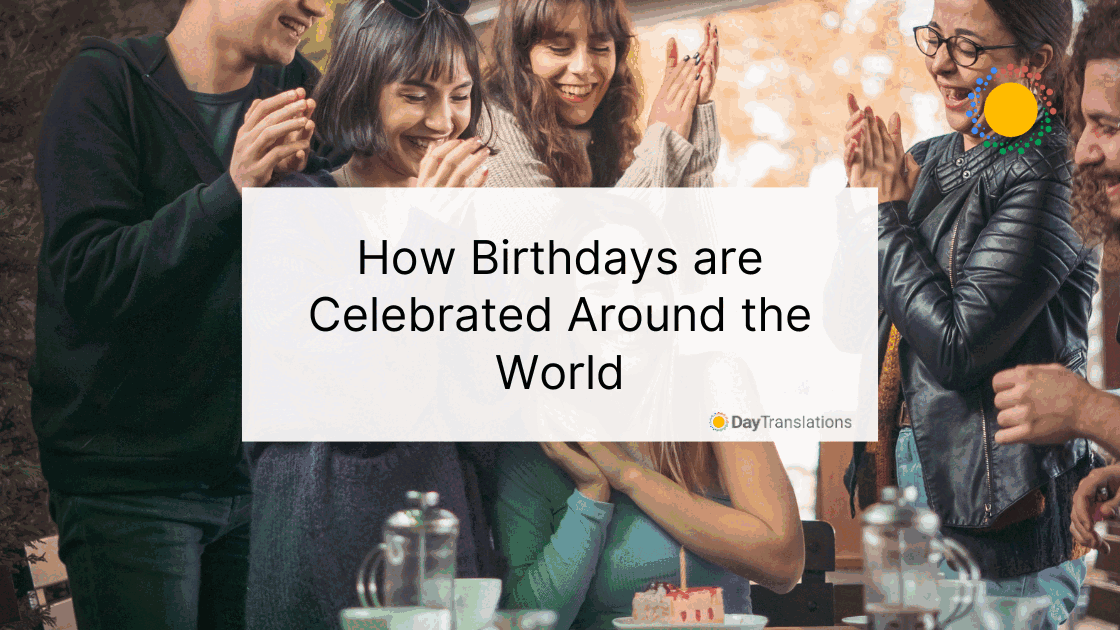Whether you are greeting Zorionak in Basque, feliz cumpleanos in Spain, biba kumpianos in Chamorro or sheng ri kuai in China, it all means the same thing: Happy birthday! Birthdays are truly a special occasion, no matter your age. It’s not surprising that people all over the world celebrate this important event. From over the top festivities to simple traditions, how birthdays are celebrated around the world can provide a glimpse of the various cultural differences around the world.
Special treats for the celebrant
Who doesn’t love a great gift? In Korean, a baby receives gifts of cash on his first birthday.
However, birthday gifts don’t always come in packages wrapped in bows. Sometimes, there are special things done to commemorate the special day of the birthday celebrant.
In India, the birthday celebrant gets to wear new clothes. He starts the day by touching the feet of his parents to show respect. Next, the family visits a shrine to pray for blessings for the celebrant.
In Argentina and Brazil, the celebrant gets his earlobes pulled for each year of his birthday. Celebrants in Equador can expect a birthday greeting via phone call or by greeting card, but only on the actual day of their birth, or on the Feast day of the Patron Saint they are named after.
Birthday celebrants in Germany don’t need to do chores or homework on their special day.
For Chinese children, items decorated with tigers are given during the first birthday, since they believe that tigers are protectors of the child. However, it is not auspicious to give a clock as a gift to a Chinese person at any age.
The birthday party
Germans are actually credited with starting birthday parties, called Kinderfest, and this custom has spread all over the world.
Equadorian celebrants enjoy an afternoon tea party where they feast on raisin cake, cookies and hot chocolate.
Guests at a Peruvian birthday party receive two recordatorias, or party favors. The guests get to bring home a loot bag filled with sweet goodies and a pin to mark the special party.
In New Zealand, the guests of the celebrant sing the Happy Birthday song as loud as they can. Next, the guests will clap the number of times of the years of the celebrant, plus an extra clap for good luck.
In Nigeria, lavish parties are held when a child reaches specific milestone ages and the feast includes a roasted cow or goat.
In China, a birthday party must have noodles, to symbolize long life. Guests oftentimes give the celebrant a small red envelope filled with money.
The age matters
The people of Korea celebrate a child even before he hits his first birthday. To mark the first 100 days of a child, a small party is held wherein rice cakes, red and black bean cakes and wine are served. When the baby reaches his first year, another big celebration is held.
In Egypt, the first birthday is also the most special. During the birthday party, the area is decorated with fruits and flowers to symbolize life and growth. The first birthday of a child is likewise important for the people of India. Here, a child is tonsured since removing the hair of the child is symbolic of spiritual renewal.
The Dutch call birthdays Crown years and for the people of Holland, the milestone ages are 5, 10, 20 and 21. Nigerians, on the other hand, consider the ages of 1, 5, 10 and 15 are the most important.
For many Latin American countries such as Ecuador, Peru and Mexico, the biggest birthday party a girl can have is when she turns 15. This is called a quinseanera, wherein the celebrant gets to wear an elaborate pink dress and her first pair of high heels. She gets to dance with her father along with her entourage of 14 young men and women.
In Israel, the most special year is the 13th birthday and this is celebrated with a party called a Bar or Bat Mitzvah. This coming of age party takes months of preparation and marks the acceptance of the child to follow Jewish law.
For the Japanese, the milestone birthdays are held when the child reaches the age of 3, 5 and 7. When the child reaches these ages, he can be brought to the Shichi-go-san Festival, which is held every year every November 15.
It’s cake time
Germans have a birthday wreath made of wood that is placed at the center of the dining table. A candle is placed on the wreath to mark each year of his birth and this custom is done till the child becomes 12 years old. For the cake, a special type of bread called geburstagorten is used. This is a delicious type of bread that is shaped like the infant Jesus.
Over in Ghana, the celebrant starts the day by eating oto, a deep fried patty of mashed sweet potato and egg. Russians, on the other hand, may opt to celebrate with a birthday pie instead of a birthday cake.
In Australia, Fairy Bread is served. This is a decadent buttered bread that is decorated with sprinkles.
What? No birthday?
It may be surprising to find out that not everyone celebrates their birthday on the actual day of their birth.
The people of Vietnam celebrate birthdays differently since everyone considers the Tet or the beginning of the New Year as their own birthdays. Individual birthdays are not celebrated. Here, the adults hand children small red envelopes filled with money during Tet.
In Serbia, instead of celebrating their personal birthday, they honor Krsno Ime or Krsna Slava, which has ethnic and religious roots. This celebration is in commemoration of when the Serbs accepted Christianity.













Sorry, the comment form is closed at this time.